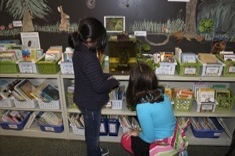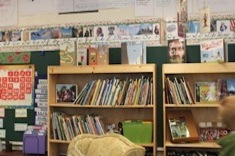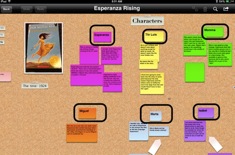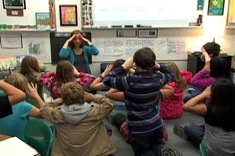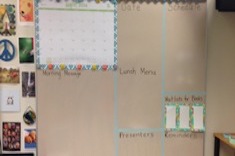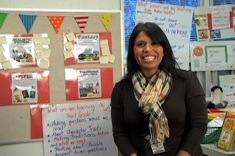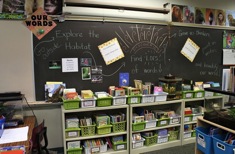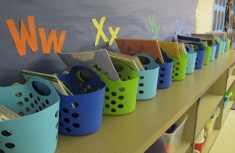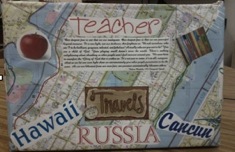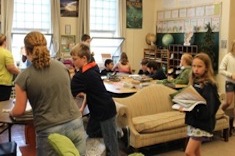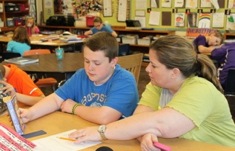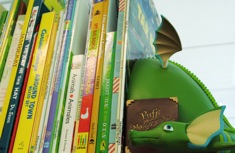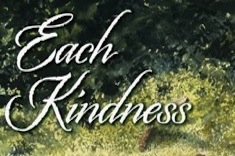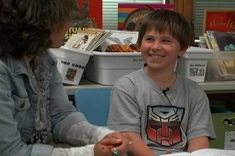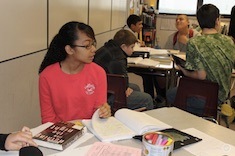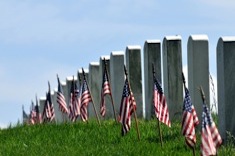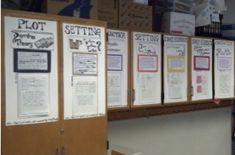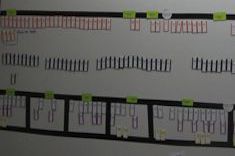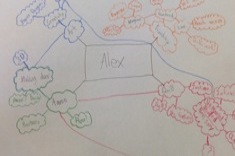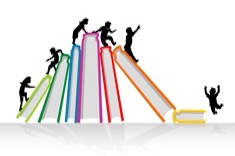5th
Latest Content
Reading Passports
Justin Stygles develops reading passports as an alternative to traditional reading logs with his fifth- and sixth-grade students.
Inviting Book Tub Titles: Nonfiction Library Redesign
Andrea Smith discovers the value of more creative nonfiction book tub titles after listening to ideas from her students.
Reorganizing the Classroom Library
Katherine Sokolowski looks at challenges from the previous year for ideas on reorganizing the classroom library.
Digital Boards for Formative Assessment
Katharine Hale has moved much of her reading response to digital boards, which are also a useful tool for formative assessment.
Independence in Writing Workshop
Beth Lawson uses an LCD, whiteboard, and magnetic clips in a clever way during the transition from minilessons to independent writing in writing workshop. Students tag whether they will be working on drafts or conferring with peers as Beth completes her status of the class on the board.
Community Board: Invitations to Independence
Students transition between home and school with the Community Board in Andrea Smith’s classroom. It’s a lively bulletin board that is updated and discussed daily in her fourth-grade classroom.
A Classroom for Elementary English Language Learners
Stella Villalba gives a tour of her classroom library and publishing corner designed to support the grades 1-5 English language learners she works with daily.
Helping Allison Redesign Her Classroom Nonfiction Library
Andrea Smith shares her best advice for library design that celebrates nonfiction as much as fiction.
Effective Organization
Ruth Ayres has tips for organizing desks, tables, chairs, and materials to support literacy learning.
Getting to Know You: Brown Bag Objects
Maria Caplin uses a getting-to-know-you activity in the first days of school to jumpstart research reading and writing with her fifth-grade students.
Shoebox Autobiographies
Susan Dee uses shoebox autobiographies to build community and relationships with students early in the fall.
The Case Against Management Systems
Katherine Sokolowski advises teachers to ditch the search for the perfect management system, and instead focus on building relationships early in the school year.
Launching a Sort
Launching a sort with primary students early in the year begins not with words, but with leaves for Max Brand.
The First Days of Reading and Writing Workshops
Katherine Sokolowski explains how she spends her time during the first days of literacy workshops in her fifth-grade classroom.
Using Summer Reading as Bookends for the School Year
Karen Terlecky has advice for using summer reading for launching and closing the school year to build community and enduring connections with students.
30 Books in 30 Days
Justin Stygles uses the 30 Books in 30 Days project to introduce his sixth graders to a wide variety of authors and genres.
Character Through Literature Early in the Year
Katherine Sokolowski finds that the beginning of the year is the best time to build community with a unit on character and morals through literature.
Planning for Instruction: Sea Glass
Karen Terlecky uses sea glass as a metaphor for the assessments she completes to launch the year, and data analysis all year long.
Fifth-Grade Memoir Writing: Conferring with Wesley
Ruth Ayres confers with fifth grader Wesley about his personal narrative on scouting.
Many Possibilities for Student Podcasting
Katherine Sokolowski shares how she has integrated podcasting into her 5th grade classroom.
The Information Board: Celebrating Nonfiction Every Day
Andrea Smith builds interest in nonfiction in her fourth-grade classroom community through her constantly changing Information Board.
A Booklist for Memorial Day
Sarah Klim’s latest booklist includes titles for honoring those who serve on Memorial Day.
Nonfiction Book Blitz
Justin Stygles finds a nonfiction book blitz is the perfect unit for closing out the school year.
Final Literacy Contracts: Student-Generated Themes
Megan Ginther and Holly Mueller close out the year with their final literacy contracts. It’s time for students to take ownership of their learning, so they select the themes.
Capturing the Elementary Years with Photo Essays
Justin Stygles helps his sixth graders prepare to move to middle school with a photo essay assignment in the last weeks of school.
Reader Response Anchor Charts
Christopher Carlson describes why and how he made reader response anchor charts more rigorous and thoughtful in his fifth-grade classroom.
The Data Wall Debacle
Shari Frost has a suggestion for what shouldn’t be on classroom walls: student assessment scores. She explains why this practice can be harmful to students.
Student Work Ethic: Overcoming Spring Fever
Katherine Sokolowski finds the work ethic of her fifth-grade students is flagging by spring, so she helps them reflect upon and improve their performance.
Understanding the Summer Slide: Sharing Data with Parents and Students
Clare Landrigan and Tammy Mulligan explain why it is important to share data with parents while school is still in session in order to avoid the summer slide. This is another installment in their summer reading series.
Getting Ready for Summer Reading: A Lesson Cycle
Franki Sibberson designs a lesson cycle to prepare students for summer reading.
Browse Content By
Type
Category
- Assessment Tools
- Big Fresh Archives
- Booklists
- Choice Numeracy
- Classroom Design
- Common Core
- Community Building
- Conferring
- Content Literacy
- Digital Literacy
- English Language Learners
- Equity
- Family Relations
- Free Samples
- Guiding Groups
- Leadership
- Literacy Coaches
- Mentor Texts
- Minilessons
- New Teacher Mentors
- Podcasts
- Poetry
- Quote Collections
- Reading Strategies
- Self Care
- Struggling and Striving Learners
- Talking and Listening
- Teacher Study Groups
- Teaching Reading
- Teaching Writing
- Word Study and Vocabulary
Author
- Melissa Quimby
- Nawal Qarooni
- Gwen Blumberg
- Julie Cox
- The Lead Learners
- Hannah Tills
- Josie Stewart
- Ruth Metcalfe
- Mallory Messenger
- Becca Burk
- Jodie Bailey
- Vivian Chen
- Mary Brower
- Tiffany Abbott Fuller
- Stephanie Affinito
- Ruth Ayres
- Leigh Anne Eck
- Heather Fisher
- Shari Frost
- Julie Johnson
- Suzy Kaback
- Gigi McAllister
- Shirl McPhillips
- Melanie Meehan
- Cathy Mere
- Debbie Miller
- Tara Barnett and Kate Mills
- Tammy Mulligan
- Dana Murphy
- Bitsy Parks
- David Pittman
- Brenda Power
- Heather Rader
- Matt Renwick
- Mandy Robek
- Christy Rush-Levine
- Gretchen Schroeder
- Jen Schwanke
- Brian Sepe
- Katherine Sokolowski
- Stella Villalba
- Jennifer Vincent
Grade Level
Choice Literacy Membership
Articles
Get full access to all Choice Literacy article content
Videos
Get full access to all Choice Literacy video content
Courses
Access Choice Literacy course curriculum and training


